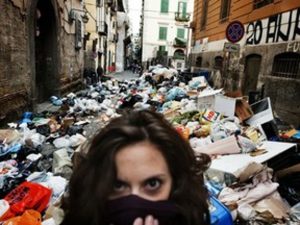By: Johannah Brown
Impunity Watch News Staff Writer
NAPLES, Italy – In the case Locascia and Others v. Italy, the European Court of Human Rights (ECHR) issued a preliminary ruling in favor of the applicants. The case, initially filed in 2010 by nineteen residents from the Caserta and Naples provinces, revolves around a state of emergency declared in 1994 over the mismanagement of the waste cycle that lasted for more than a decade. The ruling found that Italy’s handling of the 15-year-long garbage crisis violated the human rights of the residents. The Court determined that Italian authorities had contravened Article 8 of the European Convention on Human Rights, which safeguards the right to respect for private life and home. The violations stemmed from their failure to ensure proper waste collection, treatment, and disposal and neglecting to take the necessary precautions to protect the applicants’ human rights.
 |
In 1994, Italian authorities appointed a special commissioner to take control of the waste cycle, which had previously been under the unofficial control of organized crime (the Camorra). The Camorra had been profiting from controlling dumps in the region and engaging in the illegal business of transporting waste from the northern industrial areas and dumping it in local sites. Over time, both legal and illegal dumps filled, interrupting service and accumulating garbage in the streets and neighborhoods. The crisis disrupted daily life, impacting mobility, prompting school closures, and affecting local markets, forming the basis for the Article 8 complaints.
The court’s ruling also addressed the environmental effects of a dumping site outside Naples called Lo Uttaro. Three decades of illegal dumping and burning of trash led to severe groundwater contamination, resulting in multiple bans on the use of groundwater in the area and air pollution affecting residents’ health. Despite the site being closed in 2001 and the awareness of environmental hazards, authorities reopened the site in 2007. During this period, several environmental studies, including one by the World Health Organization (WHO), revealed significantly higher cancer mortality rates in the provinces of Naples and Caserta compared to the rest of the Campania region, as well as more frequent signs of congenital malformations. According to the court, Italy has still not fully implemented plans to secure and clean up the site, and there was no clear timeframe to do so.
The recent ruling by the ECHR was based on these studies, as well as various judicial and administrative decisions, including judgments from the Court of Justice of the European Union (CJEU). While the court did not pinpoint responsibility for the crisis, it ruled—concerning the inadequate handling of waste collection, treatment, and disposal—that the Italian authorities had violated the applicant’s right to private life and home. Regarding the complaint about the clean-up of Lo Uttaro, the Court ruled that authorities failed to take the necessary measures to protect the applicants’ rights, therefore violating Article 8 of the Convention.
The judgment is a Chamber Judgment and is not final. If the ruling is upheld, Italy must submit a plan outlining the actions they intend to take in response to the ruling.
For further information, please see:
EU Law Live – ECtHR finds violation of human rights in Campania Waste Crisis – 19 Oct. 2023
Reuters – Mafia involvement in Naples Garbage Crisis – 9 Jan. 2008